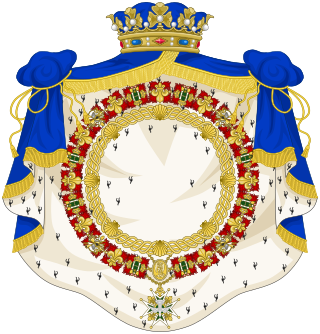See also
- Lists of dukedoms
- Duke (disambiguation) for people and places named Duke
Lists of dukes include:

A marquess is a nobleman of high hereditary rank in various European peerages and in those of some of their former colonies. The German language equivalent is Markgraf (margrave). A woman with the rank of a marquess or the wife of a marquess is a marchioness or marquise. These titles are also used to translate equivalent Asian styles, as in Imperial China and Imperial Japan.
Peerages in the United Kingdom form a legal system comprising both hereditary and lifetime titles, composed of various ranks, and within the framework of the Constitution of the United Kingdom form a constituent part of the legislative process and the British honours system. The British monarch is considered the fount of honour and is notionally the only person who can grant peerages, though there are many conventions about how this power is used, especially at the request of the British government. The term peerage can be used both collectively to refer to the entire body of titled nobility, and individually to refer to a specific title. British peerage title holders are termed peers of the Realm.

Duke is a male title either of a monarch ruling over a duchy, or of a member of royalty, or nobility. As rulers, dukes are ranked below emperors, kings, grand princes, grand dukes, and sovereign princes. As royalty or nobility, they are ranked below princes and grand dukes. The title comes from French duc, itself from the Latin dux, 'leader', a term used in republican Rome to refer to a military commander without an official rank, and later coming to mean the leading military commander of a province. In most countries, the word duchess is the female equivalent.

A viscount or viscountess is a title used in certain European countries for a noble of varying status. The status and any domain held by a viscount is a viscountcy.
The Peerage of Ireland consists of those titles of nobility created by the English monarchs in their capacity as Lord or King of Ireland, or later by monarchs of the United Kingdom of Great Britain and Ireland. It is one of the five divisions of Peerages in the United Kingdom. The creation of such titles came to an end in the 19th century. The ranks of the Irish peerage are duke, marquess, earl, viscount and baron. As of 2016, there were 135 titles in the Peerage of Ireland extant: two dukedoms, ten marquessates, 43 earldoms, 28 viscountcies, and 52 baronies. However, these titles have no official recognition in the Republic of Ireland, with Article 40.2 of the Constitution of Ireland forbidding the state conferring titles of nobility and stating that an Irish citizen may not accept titles of nobility or honour except with the prior approval of the Irish government.

Count is a historical title of nobility in certain European countries, varying in relative status, generally of middling rank in the hierarchy of nobility. Especially in earlier medieval periods the term often implied not only a certain status, but also that the count had specific responsibilities or offices. The etymologically related English term "county" denoted the territories associated with some countships, but not all.

The Peerage of France was a hereditary distinction within the French nobility which appeared in 1180 during the Middle Ages.
The Peerage of Great Britain comprises all extant peerages created in the Kingdom of Great Britain between the Acts of Union 1707 and the Acts of Union 1800. It replaced the Peerage of England and the Peerage of Scotland, but was itself replaced by the Peerage of the United Kingdom in 1801.
The Peerage of the United Kingdom is one of the five Peerages in the United Kingdom. It comprises most peerages created in the United Kingdom of Great Britain and Ireland after the Acts of Union in 1801, when it replaced the Peerage of Great Britain. New peers continued to be created in the Peerage of Ireland until 1898

The House of Gediminid or simply the Gediminids were a dynasty of monarchs in the Grand Duchy of Lithuania that reigned from the 14th to the 16th century. A cadet branch of this family, known as the Jagiellonian dynasty, reigned also in the Kingdom of Poland, Kingdom of Hungary and Kingdom of Bohemia. Several other branches ranked among the leading aristocratic dynasties of Russia and Poland into recent times.

The nobility of Italy comprised individuals and their families of the Italian Peninsula, and the islands linked with it, recognized by the sovereigns of the Italian city-states since the Middle Ages, and by the kings of Italy after the unification of the region into a single state, the Kingdom of Italy.
Lists of dukedoms include:

The title of Duke was the highest hereditary title in the French nobility during the time of the monarchy in France.
The British nobility is made up of the peerage and the (landed) gentry. The nobility of its four constituent home nations has played a major role in shaping the history of the country, although the hereditary peerage now retain only the rights to stand for election to the House of Lords, dining rights there, position in the formal order of precedence, the right to certain titles, and the right to an audience with the monarch.

Marquess is a rank of nobility in the peerages of the United Kingdom.
Duke, in the United Kingdom, is the highest-ranking hereditary title in all five peerages of the British Isles. A duke thus outranks all other holders of titles of nobility.
A peerage is a legal system historically comprising various hereditary titles in a number of countries, and composed of assorted noble ranks.